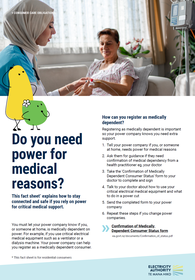If you rely on electricity for medical reasons
If you or someone at home relies on electricity to prevent serious harm to health, let your power company know. They must help you get registered as a medically dependent consumer. Your electricity provider cannot disconnect you if they know you or someone in your household is a medically dependent consumer. You are still required to pay your bills.
On this page —
Prepare for power cuts
Power cuts happen from time to time for many reasons. Even if you are medically dependent, a constant power supply cannot always be guaranteed. You should have an emergency response plan in place.
Work with your healthcare providers and support people to prepare for when the power goes out. Ensure you have backup power solutions and alternative arrangements ready.
Make a power cut emergency plan
It's vital you prepare for when the power goes out so you can remain safe and well. Make an emergency plan and share it with the people you rely on.
Register as a medically dependent consumer
If you or someone at home relies on electricity for medical reasons, let your power company know so they can help you register as a medically dependent consumer.
Your power company must not cut off your power if you or someone in your household is:
- registered as a medically dependent consumer
- in the process of applying to register as a medically dependent consumer, or
- disputing a decision by a power company on medically dependent consumer status.
Follow these steps to register with your power company:
- Tell your power company about your need for electricity to support your medical condition or ask the account holder to tell them for you.
- Get an emergency response plan template from your power company to ensure you are prepared if the power goes out.
- If your power company requests confirmation of your medical dependency from a health practitioner (eg, your doctor), ask them to guide you through the process. They will be able to help you using this guide.
- Take the Confirmation of Medically Dependent Consumer Status form and your emergency response plan to your doctor so they can sign the form and help you make your plan for power cuts.
- Talk to your doctor about backup power for medical equipment.
- Complete and submit Confirmation of Medically Dependent Consumer Status form to your power company.
- Repeat these steps if you switch to a new power company.
Are you a health practitioner?
This guidance will help you to identify and assist your medically dependent patients.
Choose a postpay plan
There are two main types of power plan, prepay and postpay:
- In prepay plans, you pay for the power before using it.
- In postpay plans, you pay for the power after you’ve used it. This is usually at the end of the month.
It's safer for households with medically dependent consumers to be on postpay power plans. Postpay customers cannot be disconnected for non-payment if the power company knows a medically dependent consumer lives there. On prepay plans, electricity supply will stop if/when the account runs out of credit.
If you would like support finding a suitable power plan, contact your power company and they can advise on the most suitable plan for your household's circumstances and electricity use.
You can also use Powerswitch, a free online tool funded by the Electricity Authority, to compare different power deals and choose the power company and plan that best suit your needs.
FAQs
Here are some frequently asked questions to help you.
What do I do if I am disconnected?
If you, or someone in your home is medically dependent, make sure to:
- call 111 if there’s a medical emergency
- follow your emergency plan
- contact your power company immediately
- if you cannot get through to your power company, contact Utilities Disputes on 0800 223 340.
When your power is reconnected, if you have any concerns about the disconnection process not meeting the Consumer Care Obligations, you can raise a concern with the Electricity Authority. If you are unsure, contact Utilities Disputes for assistance.
What’s the difference between disconnection and a power cut?
A disconnection is when your power company turns off your electricity. For example, due to non-payment.
A power cut or outage can be planned or unplanned:
- Planned power cuts can be scheduled to complete necessary maintenance work on distribution networks or the national electricity transmission grid. Affected properties would be advised by their power company, lines company or Transpower.
- Unplanned power cuts can occur when distribution or transmission infrastructure is damaged from bad weather, natural disasters or equipment failure, or in the unlikely event there is not enough electricity generation to meet supply.
What if I can't pay my bill?
Households with known medically dependent consumers cannot be disconnected for unpaid bills. However, these households are still required to pay their bills, and power companies may take action for non-payment.
If you are having difficulty paying your power bill, you should let your power company know as soon as possible. They can work with you to find a suitable payment plan and provide you with information for further support.
Find out what your power company must do if you're finding it hard to pay your bills
There are services that can provide financial support, for example MoneyTalks is a free and confidential helpline that can connect you with financial mentors and services in your community.
